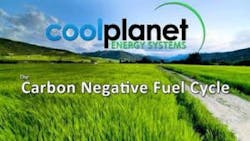Three New Bio-refineries to Pump Up Louisiana's Energy Sector
Energy production in Louisiana got a shot in the arm last week when Cool Planet Energy Systems announced it will invest $168 million to build three bio-refineries in the state.
The modular biomass-to-gasoline refineries will be built in Alexandria, Natchitoches and a site to be determined. About 72 new direct jobs will be created as well as 422 indirect jobs. Additionally 750 construction jobs will be created.
“For decades, Louisiana’s oil and gas leaders have teamed up with our remarkable work force to pave the way in energy production for our nation and the world,” said Governor Bobby Jindal. “We are now setting the pace for innovative new technologies that harness Louisiana’s renewable energy resources and supply advanced fuels to meet our nation’s energy demands.”
Cool Planet uses small-scale bio-refineries, to economically convert nonfood biomass into high-octane gasoline, jet fuel and diesel fuel. The company will harvest wood waste and forest byproducts to make gasoline at its initial commercial-scale facilities in Louisiana. Each bio-refinery will be capable of producing 10 million gallons of high-octane, low-vapor pressure gasoline for strategic distribution through existing market channels and for blending at Louisiana refineries. The fuel will be compatible for use in existing vehicles on the road today.
“Cool Planet chose Louisiana for multiple reasons, including abundant renewable feedstock supply and a business-friendly attitude toward innovative companies like ours,” Cool Planet Energy Systems CEO Howard Janzen said. “The support we have seen here enhances our unique distributed production model, which envisions locating small bio-refineries near biomass sources to keep both operating and capital costs low. Our goal is to have operating and capital costs that are competitive with conventional oil industry gasoline production costs.”
The company will also market biochar, a byproduct of the refining process that will be used as an agricultural supplement to boost water retention and reduce carbon released from crops. This process makes Cool Planet’s overall production cycle a carbon-negative process – meaning the project will achieve a net reduction of greenhouse gases.
Additionally, these projects will benefit Louisiana’s timber industry. Cool Planet recently met in Washington, D.C., with both the U.S. Department of Agriculture and the Environmental Protection Agency to ensure that the wood residues the company will be using in its first commercial facility will be federally certified as producing a renewable, cellulosic gasoline from the sustainably harvested wood products right here in Louisiana.
Cool Planet will be able to use wood residues — such as the tops of trees, branches, tree bark and tree thinnings — that will create additional value for our Louisiana forest owners and timber management companies. The wood chips that Cool Planet uses are sustainably harvested and included as part of the federally approved pathway for the renewable fuel standard.
In addition to the renewable, high-octane gasoline to be produced, Cool Planet will be returning a portion of the wood residues back to the land. he company will do this in the form of soil-enhancing biochar, with a patented process that helps maintain critical water and nutrients in the soil. The whole process has the ability to reduce greenhouse gases by 150% over conventional gasoline.
Cool Planet’s production plants will be 100 times smaller than a typical oil refinery, but the company’s largely prefabricated systems can be moved near concentrated biomass sources, reducing transportation costs and increasing efficiency. Those savings will enable the company to produce gasoline that’s competitive with oil refineries at prices as low as $50 per barrel while eliminating the need for government fuel credits or subsidies.
The City of Alexandria will provide gas, water, sewer and electrical upgrades, along with road improvements at the 30-acre Port of Alexandria site. Upriver from Alexandria, the Natchitoches Parish Port will provide a Red River site for Cool Planet’s second bio-refinery in Louisiana.
LED began working with Cool Planet on potential Louisiana locations in September 2012. To secure the project, Louisiana offered the company a competitive incentive package that includes a $750,000 Economic Development Award Program grant to offset infrastructure costs, along with the services of LED FastStart – the nation’s No. 1-ranked state workforce training program. Cool Planet also is expected to utilize the state’s Quality Jobs and Industrial Tax Exemption programs.
The company’s business model calls for developing 400 of the micro-refineries across the U.S. in the next decade. Major Cool Planet investors include BP, Google Ventures, Energy Technology Ventures (GE, ConocoPhillips and NRG Energy), North Bridge Venture Partners, Shea Ventures and the Constellation division of Exelon.
